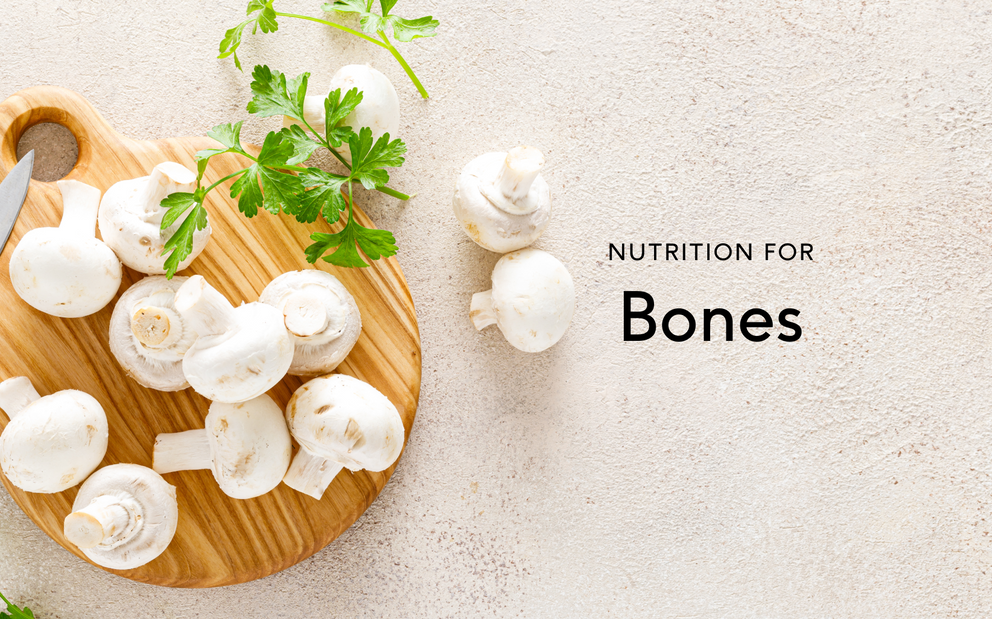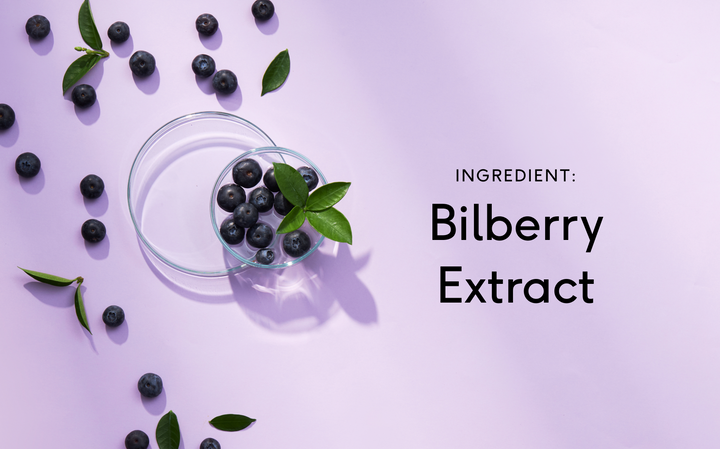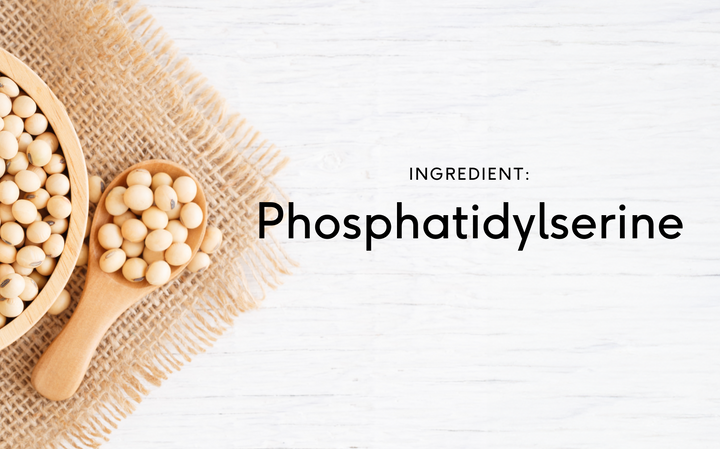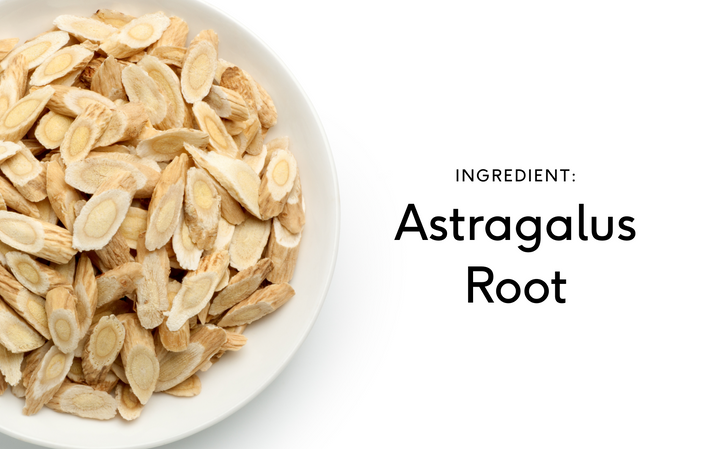Best 5 Foods to Strengthen Your Bones Naturally
Table of contents

Your bones are responsible for many important body functions including body support, internal organs protection, hematopoiesis, facilitation of movement and storage of fat and calcium. Calcium, vitamin D and vitamin K play a vital role in keeping the bones healthy, therefore, diet full of foods containing these nutrients is an absolute must.
Which foods are best for bones?
1. Mushrooms
Packed with copper, zinc, selenium, and vitamin D mushrooms are a true superstar ingredient you should consider adding to your diet. With the obvious benefits for your bone health, mushrooms are also proved to stimulate hair growth and help with skin inflammation.
- Calories per 100g: 30
- Grams of fibre: 10
- Grams of protein: 4
- Grams of fats: 5
- Grams of carbs: 17
2. Goa beans
Also known as winged beans, goa beans contain the highest calcium concentration of any legume which makes it a perfect source of calcium for people eating a plant-based diet. With Goa beans also being high in iron, manganese, copper, phosphorus, and magnesium, they are a real superfood which could make a significant difference to your bones’ health.
- Calories per 100g: 148
- Grams of fibre: 25
- Grams of protein: 12
- Grams of fats: 1
- Grams of carbs: 28
3. 100%-cacao chocolate
It isn’t the milk or dairy in chocolate that makes it high in magnesium—it’s the cacao beans themselves. Even vegans can have chocolate if it’s 100%-cacao, which means it contains nothing but pure cacao beans.
It might come as a surprise but just like spinach, kale and beets, chocolate also contains oxalates (or oxalic acid) which plays an important role in the body’s ability to absorb calcium.
- Calories per 100g: 400
- Grams of fibre: 30
- Grams of protein: 12
- Grams of fats: 40
- Grams of carbs: 30
4. Walnuts
Walnuts are great sources of alpha linolenic acid, a fatty acid that prevents bone breakdown. These tree nuts also contain plenty of essential nutrients to keep your bones strong and healthy.
- Calories per 100g: 700
- Grams of fibre: 7
- Grams of protein: 15
- Grams of fats: 70
- Grams of carbs: 15
5. Spinach
High in iron and vitamin C, spinach also contains relatively high amounts of calcium, which makes this natural food perfect for boosting bone health.
- Calories per 100g: 23
- Grams of fibre: 2
- Grams of protein: 3
- Grams of fats: 5
- Grams of carbs: 4
Benefits of mushrooms for bones
Why are mushrooms good for bones?
Your body needs vitamin D to process calcium, and mushrooms are one of the only plant sources of this essential nutrient. Many mushrooms synthesise vitamin D, and exposure to ultraviolet light increases vitamin D levels in fungi even further.
When and how to eat mushrooms
You can eat edible mushrooms raw, cooked, or dried. Meals like cream mushroom soup, mushroom sauté or risotto are not only easily prepared but also are an affordable option that can be enjoyed by people with very different dietary preferences.
How are mushrooms under-appreciated?
Many types of mushrooms mimic animal tissue. Fungi are the only known life forms aside from humans and synthesised yeast to synthesise vitamin D from sunlight, for instance. Mushrooms also contain B vitamins, also only commonly found in animal sources. It’s unclear how mushrooms came to have their impressive properties, but they are certainly under-appreciated.
Dish ideas
You don’t have to be a professional chef to make mushroom burgers. Check out some recipes online and serve up some vegan patties to your friends and family.
Benefits of goa beans for bones
Why are goa beans good for bones?
Beans contain tons of nutrients, including calcium. Goa beans, however, contain the most calcium of any legume. If you’ve sworn off meat and dairy entirely, anxiety over how much calcium you eat can be a real concern and adding goa beans to your diet can help ease your mind.
When and how to eat goa beans
Goa beans are more like snap peas than they’re like black beans. Therefore, it’s best to use these beans to accentuate dishes instead of serving them as the main course.
How are goa beans under-appreciated?
Winged beans are relatively hard to cook, so they are not commonly found in the Western cuisine. They contain around twice the amount of calcium found in the pinto, black, or garbanzo beans so you should aim to incorporate them into your diet.
Dish ideas
Winged beans add something new to stir-fry that you probably haven’t tried before. Toss these long, green beans in with the rest of your ingredients when it’s time to pan fry your delicious meal.
Benefits of 100%-cacao chocolate for bones
Why is 100%-cacao chocolate good for bones?
Dark chocolate contains lots of magnesium, which your body needs to defend the calcium-dominant parts of your bones. 100%-cacao chocolate contains less calories, but you still get all the magnesium you need to maintain healthy bones.
When and how to eat 100%-cacao chocolate
The only rule to remember with chocolate is that it melts. As long as high temperatures aren’t a problem, you can snack on 100%-cacao chocolate cocoa nibs whenever and wherever you like.
How is 100%-cacao chocolate under-appreciated?
Chocolate has gotten a bad name since it’s usually paired with dairy and sweeteners. The cacao part of chocolate, however, is very nutritious, and it’s worth incorporating into your diet if you don’t mind a little bit of bitterness.
While dark chocolate has many beneficial to health qualities it is also high in fat and calories, so moderation is a key.
Dish ideas
Raw cacao bites can be a healthy choice for when that sugar craving kicks in. Place cacao, Medjool dates and your favourite nuts into a food processor and blend until smooth. Make balls with your hands and voila - they are ready to serve.
Benefits of walnuts for bones
Why are walnuts good for bones?
Walnuts contain alpha-linolenic acid, an omega-3 fatty acid that’s good for bones. This fatty acid has a number of wide-ranging benefits, and walnuts also contain reasonably high concentrations of calcium. If you’re looking for a calcium-rich nut, however, almonds are the clear winner.
When and how to eat walnuts
Walnuts can be eaten raw, but you can also toast to bring out the stronger flavour. You can also add chopped walnuts to the top of your salad or canapés. Not looking to experiment in the kitchen – pop a few nuts to a cup of plain Greek yogurt for a healthy morning or afternoon treat.
How are walnuts under-appreciated?
While it’s true that walnuts are extremely calorie-rich, they also contain lots of nutrients your body will appreciate. In moderation, nuts can be very nutritious.
Dish ideas
Crushed walnuts blend well with a base of rice or your choice of carb for a homemade protein bar recipe. Add some antioxidant goji berries for a tangy, nutritious punch.
Benefits of spinach for bones
Why is spinach good for bones?
While you’ll need more than just spinach to get your daily dose of calcium, this leafy green contains more calcium than most other vegetables. Spinach also contains lots of other nutrients, and boiling it gets rid of oxalates, which reduce calcium bioavailability.
When and how to eat spinach
Spinach can be a great addition to most savoury baking recipes. The next time you crave something crunchy and salty, consider spinach as a great baking ingredient for calcium, vitamin C, and many other nutrients.
How is spinach under-appreciated?
While other leafy greens, like kale and chard, have sharper tastes, spinach’s mild flavour profile makes it more eligible for sandwiches, baked goods, and smoothies.
Dish ideas
Even if you’re averse to gluten, you can still make a delicious shepherd’s pie with nutritious spinach as a base. Popular gluten-free flour alternatives for the crust include almond, rice, and cassava.




















































 Back
Back





